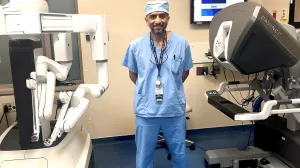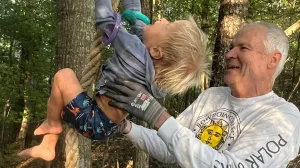He walked to the podium without a limp, as if nothing had ever happened. There was no evidence to indicate that almost exactly a year earlier, the stuff of horror movies and nightmares became reality for William Lytton, MD. He was attacked by a great white shark. But thanks to some quick thinking and a tremendous medical response, he lived to tell the tale. And tell it he did, as he returned to Tufts Medical Center on August 8, 2019, to make a special Surgery Grand Rounds presentation on the response to, treatment for and recovery from a great white shark bite and thank those whose efforts made it all possible.
“It’s really a pleasure to be back under these circumstances,” said Dr. Lytton. “Thanks for saving my life and inviting me to speak.”
Shark attack + damage control

Dr. Lytton, a neurology researcher at SUNY Downstate Health Sciences University in Brooklyn, NY, was 20 minutes into a 30-minute fitness swim in about 8 feet of water at Longnook Beach in Truro on August 15, 2018, when suddenly he felt a severe pain in his left leg. He turned and saw a great white shark sinking its teeth into his leg and trying to push him down into the water. Thinking quickly, Dr. Lytton punched the shark in a sensitive area - the gills - with his left hand, slicing two tendons in the process. The shark let go and swam away as Dr. Lytton struggled to shore, hemorrhaging blood and calling for help. Luckily, a physician, an EMT and two nursing students were at the beach that day and came to his aid until first responders arrived and took him on ambulance to a MedFlight helicopter.
Meanwhile, Trauma was receiving a notification of an incoming patient with the notation, “victim of shark attack.” they mobilized a full trauma team response: staff from the Emergency Department, Trauma Surgery, Respiratory Therapy, Critical Care, Pharmacy, Orthopedic Surgery and Neurosurgery were all on hand when Dr. Lytton arrived and immediately was taken to the OR.
Repairing his leg
Over the next 11 days, Dr. Lytton would undergo eight more procedures to repair the damage to his leg. During one of the operations, Chief of Orthopedic Trauma Scott Ryan, MD, removed a fragment of a great white shark tooth from Dr. Lytton’s leg.
“I had never operated on a shark attack victim before,” said Dr. Ryan. “The damage to his leg was significant. It reminded me of what we saw in victims of the Boston Marathon bombing. But luckily, the sciatic nerve and femoral artery were not injured and there were no bone fractures.”
“The operations went very well and I had a very good experience during my hospitalization,” said Dr. Lytton. “Kudos to Tufts Medical Center and the doctors who took care of me. My recovery was extremely smooth, given my injuries.”
Rehab + recovery
In the year since the shark attack, Dr. Lytton has been dutiful with his rehab and has recovered remarkably well. While he still has some weakness in his left leg and can’t yet jog or run, he is averaging about 15-to-16 minutes per mile walked, after walking 12.5-to-15 minute miles pre-injury. Dr. Ryan told him it could take up to two years before he achieves his pre-injury baseline.
“I’m not going to be a leg model anymore,” joked Dr. Lytton. “But I’m ok with that.”
His hand function has almost completely returned to normal. He hasn’t quite regained full extension at the joint, but it doesn’t make an impact functionally as he is able to type normally. But the one thing Dr. Lytton has yet to do since the shark attack? Get back in the water.
“My wife tells me if I’m very good, I can be upgraded from shower to bath,” he quipped.


